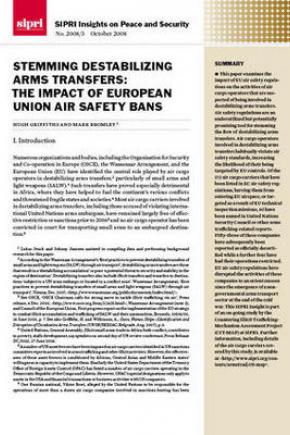Stemming Destabilizing Arms Transfers: The Impact of European Union Air Safety Bans
This paper examines the impact of EU air safety regulations on the activities of air cargo operators that are suspected of being involved in destabilizing arms transfers. Air safety regulations are an underutilized but potentially promising tool for stemming the flow of destabilizing arms transfers. Air cargo operators involved in destabilizing arms transfers habitually violate air safety standards, increasing the likelihood of their being targeted by EU controls.
Of the 172 air cargo carriers that have been listed in EC air safety regulations, barring them from entering EU airspace, or targeted as a result of EU technical inspection missions, 80 have been named in United Nations Security Council or other arms trafficking-related reports. Fifty-three of these companies have subsequently been reported as officially decertified while a further four have had their operations restricted. EU air safety regulations have disrupted the activities of these companies to an extent unseen since the emergence of a non-governmental arms transport sector at the end of the cold war.
This SIPRI Insight is part of an on-going study by the Countering Illicit Trafficking-Mechanism Assessment Project (CIT-MAP) at SIPRI. Further information, including details of the air cargo carriers covered by this study, is available at the CIT-MAP website.
I. Introduction
II. European air safety inspection, regulation and enforcement
III. Profile linkages: Why air cargo companies engaged in destabilizing arms transfers typically violate air safety regulations
IV. The impact of EU air safety bans on air carriers named as involved in destabilizing arms transfers
V. Conclusions


